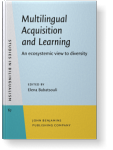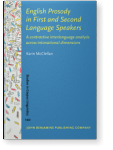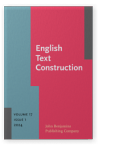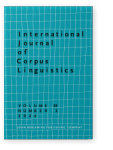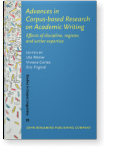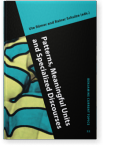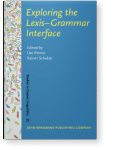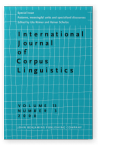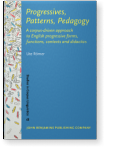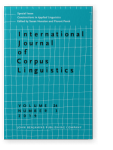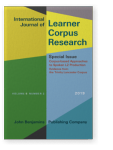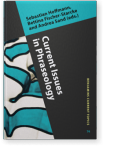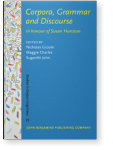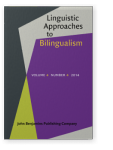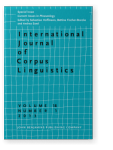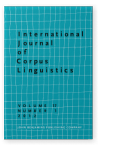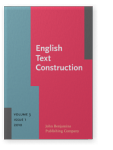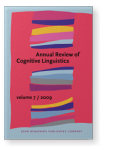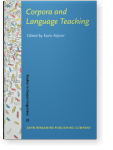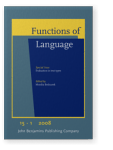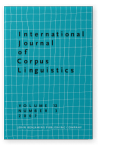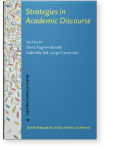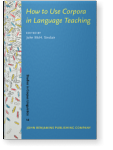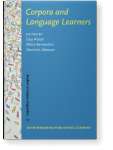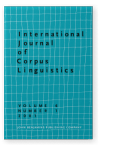Ute Römer-Barron
List of John Benjamins publications for which Ute Römer-Barron plays a role.
Book series
Journals
ISSN 1874-8767 | E-ISSN 1874-8775
ISSN 1384-6655 | E-ISSN 1569-9811
Advances in Corpus-based Research on Academic Writing: Effects of discipline, register, and writer expertise
Edited by Ute Römer-Barron, Viviana Cortes and Eric Friginal
[Studies in Corpus Linguistics, 95] 2020. vi, 358 pp.
Subjects Corpus linguistics | Discourse studies | Pragmatics | Writing and literacy
Patterns, Meaningful Units and Specialized Discourses
Edited by Ute Römer-Barron and Rainer Schulze
[Benjamins Current Topics, 22] 2010. v, 124 pp.
Subjects Corpus linguistics | Discourse studies | Pragmatics
Exploring the Lexis–Grammar Interface
Edited by Ute Römer-Barron and Rainer Schulze
[Studies in Corpus Linguistics, 35] 2009. vi, 321 pp.
Subjects Corpus linguistics | Lexicography | Syntax | Theoretical linguistics
Patterns, meaningful units and specialized discourses
Edited by Ute Römer-Barron and Rainer Schulze
Special issue of International Journal of Corpus Linguistics 13:3 (2008) 144 pp.
Subjects Computational & corpus linguistics
Progressives, Patterns, Pedagogy: A corpus-driven approach to English progressive forms, functions, contexts and didactics
Ute Römer-Barron
[Studies in Corpus Linguistics, 18] 2005. xiv + 328 pp.
Subjects Corpus linguistics | English linguistics | Germanic linguistics | Language acquisition | Language teaching | Syntax
2020 Introduction: Advances in corpus-based research on academic writing Advances in Corpus-based Research on Academic Writing: Effects of discipline, register, and writer expertise, Römer-Barron, Ute, Viviana Cortes and Eric Friginal (eds.), pp. 1–6 | Chapter
2020 A corpus-based exploration of constructions in written academic English as a lingua franca Advances in Corpus-based Research on Academic Writing: Effects of discipline, register, and writer expertise, Römer-Barron, Ute, Viviana Cortes and Eric Friginal (eds.), pp. 59–88 | Chapter
With English being the global language of research, academic English as a Lingua Franca (ELF) research has gained wide recognition. While early research showcased the dynamic nature of spoken academic ELF, written academic ELF, a more recent focus of research, remains to be under-studied.… read more
2019 A corpus perspective on the development of verb constructions in second language learners Constructions in Applied Linguistics, Hunston, Susan and Florent Perek (eds.), pp. 268–290 | Article
This article reports initial findings from a study that uses written data from second language (L2) learners of English at different proficiency levels (CEFR A1 to C1) in a large-scale investigation of verb-argument construction (VAC) emergence. The findings provide insights into first VACs in L2… read more
2019 The development of verb constructions in spoken learner English: Tracing effects of usage and proficiency Corpus-based Approaches to Spoken L2 Production: Evidence from the Trinity Lancaster Corpus, Brezina, Vaclav, Dana Gablasova and Tony McEnery (eds.), pp. 207–230 | Article
Based on datasets of L1 Italian and Spanish learner language culled from the Trinity Lancaster Corpus Sample, this paper investigates how verb-argument constructions (VACs) develop in the spoken English of L2 learners across proficiency levels. In addition to proficiency and L1 effects, we focus… read more
2015 The development of formulaic sequences in first and second language writing: Investigating effects of frequency, association, and native norm Current Issues in Phraseology, Hoffmann, Sebastian, Bettina Fischer-Starcke and Andrea Sand (eds.), pp. 83–108 | Article
Formulaic sequences are recognised as having important roles in language acquisition, processing, fluency, idiomaticity, and instruction. But there is little agreement over their definition and measurement, or on methods of corpus comparison. We argue that replicable research must be grounded upon… read more
2015 Chapter 2. Using COBUILD grammar patterns for a large-scale analysis of verb-argument constructions: Exploring corpus data and speaker knowledge Corpora, Grammar and Discourse: In honour of Susan Hunston, Groom, Nicholas, Maggie Charles and Suganthi John (eds.), pp. 43–72 | Article
This paper takes patterns identified in COBUILD Grammar Patterns 1: Verbs (Francis et al. 1996) as a starting point for the systematic, large-scale analysis of English verb-argument constructions (VACs), using both corpus/computational methods and psycholinguistic experiments. We work in an… read more
2014 Second language verb-argument constructions are sensitive to form, function, frequency, contingency, and prototypicality Linguistic Approaches to Bilingualism 4:4, pp. 405–431 | Article
We used free association tasks to investigate second language (L2) verb-argument constructions (VACs) and the ways in which their access is sensitive to statistical patterns of usage (verb type-token frequency distribution, VAC-verb contingency, verb-VAC semantic prototypicality). 131 German, 131… read more
2013 The development of formulaic sequences in first and second language writing: Investigating effects of frequency, association, and native norm Current issues in phraseology, Hoffmann, Sebastian, Bettina Fischer-Starcke and Andrea Sand (eds.), pp. 83–108 | Article
Formulaic sequences are recognised as having important roles in language acquisition, processing, fluency, idiomaticity, and instruction. But there is little agreement over their definition and measurement, or on methods of corpus comparison. We argue that replicable research must be grounded upon… read more
2012 Research on advanced student writing across disciplines and levels: Introducing the Michigan Corpus of Upper-level Student Papers International Journal of Corpus Linguistics 17:1, pp. 3–34 | Article
This paper introduces the Michigan Corpus of Upper-level Student Papers (MICUSP) as a new resource that will enable researchers and teachers of English for Academic Purposes (EAP) to investigate the written discourse of highly advanced student writers whose written assignments have been awarded the… read more
2010 Establishing the phraseological profile of a text type: The construction of meaning in academic book reviews English Text Construction 3:1, pp. 95–119 | Article
Starting from the observation that meaning does not primarily reside in individual words but in the phrase, this paper focuses on the examination of recurring phrases in language. It introduces a new analytical model that leads corpus researchers to a profile of the central phraseological items in… read more
2010 Introduction: Patterns, meaningful units and specialized discourses Patterns, Meaningful Units and Specialized Discourses, Römer-Barron, Ute and Rainer Schulze (eds.) | Miscellaneous
2009 The inseparability of lexis and grammar: Corpus linguistic perspectives Annual Review of Cognitive Linguistics: Volume 7, Ruiz de Mendoza Ibáñez, Francisco José (ed.), pp. 140–162 | Article
This paper focuses on the interface of lexis and grammar and provides corpus evidence for the inseparability of two areas that have traditionally been kept apart, both in language teaching and in linguistic analysis and description. The paper will first give an overview of a number of influential… read more
2009 Corpus research and practice: What help do teachers need and what can we offer? Corpora and Language Teaching, Aijmer, Karin (ed.), pp. 83–98 | Article
Despite the progress that has recently been made in the field of corpus linguistics and language teaching, it is not clear what impact corpora have actually had so far on English language teaching practice. Corpus researchers often claim that corpus linguistics can make a difference for language… read more
2009 Introduction: Zooming in Exploring the Lexis–Grammar Interface, Römer-Barron, Ute and Rainer Schulze (eds.), pp. 1–11 | Article
2008 Identification impossible? A corpus approach to realisations of evaluative meaning in academic writing Evaluation in text types, Bednarek, Monika (ed.), pp. 115–130 | Article
Evaluation is a pervasive element in spoken and written language but its identification poses serious problems to linguistic researchers, especially when they are dealing with larger amounts of text which require the application of computer-assisted analytic techniques. This article explores ways… read more
2008 Introduction: Patterns, meaningful units and specialized discourses Patterns, meaningful units and specialized discourses, Römer-Barron, Ute and Rainer Schulze (eds.), pp. 265–270 | Article
2007 Lexical-grammatical patterns in spoken English: The case of the progressive with future time reference International Journal of Corpus Linguistics 12:3, pp. 297–333 | Article
Based on a large set of data from one of the biggest available corpora of spoken British English (the 10-million word spoken component of the BNC), this article explores central lexical-grammatical aspects of progressive forms with future time reference. Among the phenomena investigated are verb… read more
2005 “This seems somewhat counterintuitive, though…”: Negative evaluation in linguistic book reviews by male and female authors Strategies in Academic Discourse, Tognini-Bonelli, Elena and Gabriella Del Lungo Camiciotti (eds.), pp. 97–115 | Article
2004 Textbooks: A corpus-driven approach to modal auxiliaries and their didactics How to Use Corpora in Language Teaching, Sinclair, John McH. (ed.), pp. 185–199 | Article
2004 Comparing real and ideal language learner input: The use of an EFL textbook corpus in corpus linguistics and language teaching Corpora and Language Learners, Aston, Guy, Silvia Bernardini and Dominic Stewart (eds.), pp. 151–168 | Article
How do constructions with modal verbs develop in second language learners of English? Journal of Second Language Studies: Online-First Articles | Article
The study reported on in this paper uses data from a large, pseudolongitudinal corpus of second language (L2) learner writing to investigate how L2 knowledge of verb-argument constructions (VACs) develops from low-beginner to upper-intermediate proficiency levels. The focus is on learners from… read more
